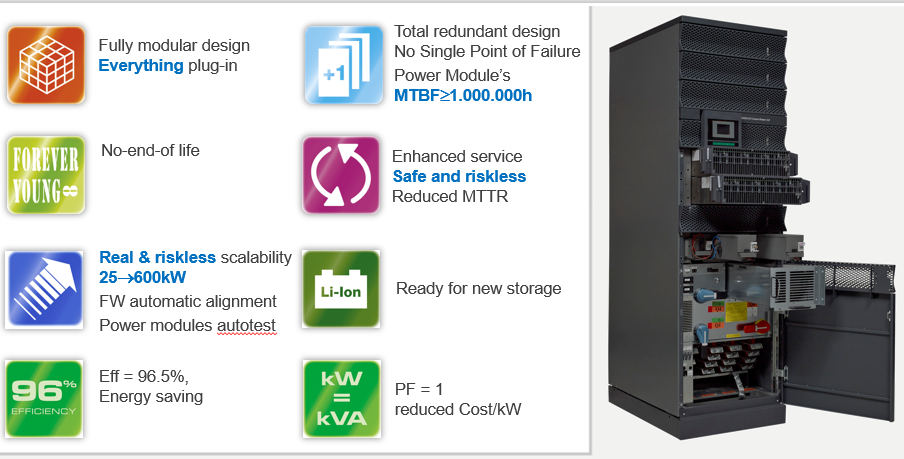The demand for data centers in Indonesia is skyrocketing as digital transformation reshapes industries across the nation. However, this growth comes with a significant environmental challenge—rising carbon emissions. Decarbonization of data centers has become a critical step for sustainable operations, emphasizing the adoption of renewable energy, carbon tracking, and innovative green technologies. As a Distributor Modular UPS Indonesia, Climanusa supports data centers with advanced UPS solutions, enabling sustainable and resilient infrastructure to meet future energy demands.
The Push for Data Center Decarbonization
Over the last decade, sustainability has shifted from being a corporate “nice-to-have” to a non-negotiable requirement. Companies increasingly demand low-carbon operations from their data center partners to align with their environmental goals. Reports indicate that Scope 1, 2, and 3 emissions—covering direct, indirect, and supply chain-related emissions—are becoming critical metrics for environmental compliance.
Key drivers behind decarbonization include:
- Regulatory Pressure: Countries, including Indonesia, are implementing stricter carbon reporting standards.
- Corporate Responsibility: Businesses aim to enhance their sustainability profiles to meet ESG (Environmental, Social, and Governance) expectations.
- Customer Expectations: Clients prioritize partnerships with organizations that actively reduce their carbon footprint.
Strategies for Decarbonizing Indonesian Data Centers
To support the decarbonization journey, data centers must adopt innovative strategies that focus on renewable energy integration, efficient power usage, and reliable carbon reporting. Climanusa’s solutions are designed to align with these goals, helping data centers reduce emissions while maintaining high performance.
- Adopting Renewable Energy Sources:
- Transitioning to renewable energy, such as solar, wind, and hydroelectric power, is the cornerstone of decarbonization. By integrating renewable energy into backup systems, Climanusa ensures uninterrupted power while minimizing reliance on fossil fuels.
- Example: Incorporating solar arrays for localized energy generation can significantly offset carbon emissions during peak operational hours.
- Implementing Advanced UPS Systems:
- Modular UPS systems from Climanusa provide energy-efficient backup power tailored to dynamic load requirements. These systems offer high efficiency and scalability, ensuring optimized energy use and reduced waste.
- The use of smart batteries, such as NiZn, further reduces environmental impact by offering longer lifespans, lower resource consumption, and safer disposal compared to traditional options.
- Real-Time Carbon Tracking:
- Data centers can adopt carbon tracking technologies to monitor and analyze energy consumption patterns. Climanusa’s solutions include energy management tools that enable operators to visualize their carbon footprint and identify areas for improvement.
- Collaborative Renewable Energy Agreements:
- Long-term Power Purchase Agreements (PPAs) with local renewable energy projects ensure consistent access to clean energy. By supporting regional green initiatives, data centers contribute to Indonesia’s overall transition to sustainable energy.
- Adopting Hourly Carbon-Free Energy (CFE):
- Hourly CFE tracking ensures that every hour of power consumption is matched with renewable energy. This approach provides transparency and encourages continuous improvement in sustainability practices.
The Benefits of Decarbonizing Data Centers
Implementing decarbonization strategies delivers tangible benefits for data centers and their stakeholders:
- Regulatory Compliance: Decarbonized operations meet Indonesia’s emerging sustainability regulations and avoid potential penalties.
- Cost Savings: Energy-efficient systems and renewable energy integration lower operational costs, improving profitability.
- Enhanced Reputation: Companies with strong sustainability initiatives attract customers, investors, and talent focused on environmental stewardship.
- Operational Resilience: Sustainable practices, such as localized energy generation, improve the reliability and stability of data center operations.
Overcoming Challenges in the Decarbonization Journey
While the path to decarbonization is essential, it also presents challenges. Key barriers include the high upfront cost of renewable energy infrastructure, the complexity of real-time carbon tracking, and the need for industry-wide standardization.
Climanusa addresses these challenges by:
- Offering modular, scalable solutions that minimize capital expenditure.
- Providing energy management tools that simplify carbon tracking and reporting.
- Aligning with global sustainability standards, such as ISO 14064, to ensure transparency and consistency in emissions reporting.
Conclusion: Building Sustainable Data Centers in Indonesia
As the digital economy expands, the decarbonization of data centers is no longer optional—it is a strategic imperative. By leveraging renewable energy, efficient power systems, and advanced carbon tracking technologies, Indonesian data centers can lead the way in sustainable innovation. Distributor Modular UPS Indonesia providers like Climanusa are committed to supporting this transition, offering tailored solutions that align with the goals of a greener and more resilient future.
Climanusa is your trusted partner for modular UPS solutions, helping Indonesian data centers achieve sustainability and operational excellence in a rapidly evolving digital landscape.
For more information, please click here.
–A.M.G–

